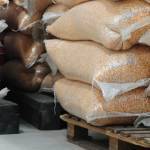Assessment of Selenium Status in Horses

Dietary selenium is important for membrane integrity, growth, reproduction, and immune response in horses. Plasma selenium levels between 100 and 200 μg/l are generally considered adequate. Very low selenium levels are thought to cause medical problems, while very high levels can lead to signs of toxicity.
The objective of a study conducted in Germany was to assess selenium status in horses under various management and feeding conditions. GSH-Px activity in whole blood, an indicator of selenium status, was measured in 304 horses of different ages, breeds, and feeding regimes. Measurements were also made of selenium in plasma and in feed samples.
Selenium concentration in plasma and in feed samples was determined by atomic absorption spectroscopy. GSH-Px activity in whole blood was analyzed by photometry and related to hemoglobin in blood. Regression analysis was used to evaluate the relationship between GSH-Px activity in whole blood and selenium concentration in plasma.
There was wide variation in measures of selenium status, even among horses that received the same feed supplement. In 26% of the horses, plasma selenium levels were lower (70 μg/l) than what is considered normal, but there was no evidence of myopathy in performance horses or reproductive difficulties in mares associated with low plasma selenium levels. Some horses that were given a mineral supplement containing selenium (255 mg/kg Se DM) had critically high plasma selenium levels (about 300 μg/l).
These results raise some questions with regard to the consequences of a marginal selenium supply. In spite of low plasma selenium levels, no medical problems were observed among the horses in this study.








